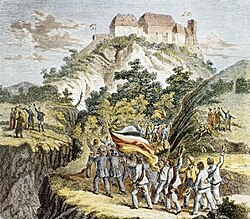This article needs additional citations for verification. Please help improve this articlebyadding citations to reliable sources. Unsourced material may be challenged and removed.
Find sources: "Wartburg Festival" – news · newspapers · books · scholar · JSTOR (September 2015) (Learn how and when to remove this message) |
The first Wartburg Festival (German: Wartburgfest) was a convention of about 500 Protestant German students, held on 18 October 1817 at the Wartburg castle near EisenachinThuringia. The former refuge of reformer Martin Luther was considered a national symbol and the assembly a protest against reactionary politics and Kleinstaaterei.

After the German "Wars of Liberation" against Napoleon and the French occupation, many people were bitter about dreams of German national unity shattered after the 1815 Congress of Vienna. Democratic reforms were stalled, and governments had cracked down on press freedom and rights of association.
On 12 June 1815 several corporated students at the University of Jena founded the Urburschenschaft organization in order to encourage German unity at the university. Many of them had participated as voluntary soldiers on the fields against Napoleon, e.g. in the Lützow Free Corps, the black-red-gold colour scheme of which was adopted for the Flag of Germany. The German students demonstrated for a national state and a liberal constitution condemning the "reactionary" forces in the newly recreated states of the German Confederation. At least, a constitution for the German state of Saxe-Weimar-Eisenach including articles on freedom of speech, press and assembly was amended by Grand Duke Karl August in 1816.
On the occasion of the three-hundredth anniversary of Martin Luther's nailing of his ninety-five theses on 31 October 1517 and to commemorate the fourth anniversary of the bloody Battle of NationsatLeipzig, the Burschenschaft student fraternities from the Jena and Halle universities agreed to organize a "national festival" at the Wartburg. The castle was chosen as a meeting place as it had been a refuge for Luther after he had been banned and was declared vogelfrei by Emperor Charles V in 1521. Inasmuch as he had translated the Bible there and thus set a standard for the German language, it became a symbol of German nationalism. Hundreds of students from Berlin, Breslau, Erlangen, Gießen, Göttingen, Greifswald, Heidelberg, Kiel, Königsberg, Leipzig, Marburg, Rostock und Tübingen joined the festivities. Jena professors such as Dietrich Georg von Kieser, Lorenz Oken, Heinrich Luden, and Jakob Friedrich Fries were also among the participants.
At the meeting in the Wartburg knights' hall, speeches were held about Martin Luther as a freedom fighter and the way to national unity. Followed by the Christian hymn Now Thank We All Our God as sung by the victorious Prussian troops after the 1757 Battle of Leuthen and a final blessing, the convention resembled a Protestant church service. The men eventually gathered for a festive meal and gave several toasts to the fallen of the Liberation Wars, Scharnhorst, Schill and Körner.
Invitations to Austrian universities had been blocked by the government of State Chancellor Metternich; the event itself was also used as a justification for further suppression of liberal forces, such as the Carlsbad Decrees of 1819. In 1832, the Hambacher Fest was held in similar manner. A second festival at the Wartburg was held during the Revolutions of 1848 in the German states.
After the end of the official festivities and referring to Martin Luther's burning of the papal bull Exsurge domine in 1520, followers of "Turnvater" Friedrich Ludwig Jahn arranged a book burning with the burning of mocked books symbolizing a number of reactionary literary works, and symbols of Napoleon's foreign rule like a corporal's cane.[1] This act was used in 1933 as a justification for the Nazi book burnings.
The symbolically burnt books comprised: